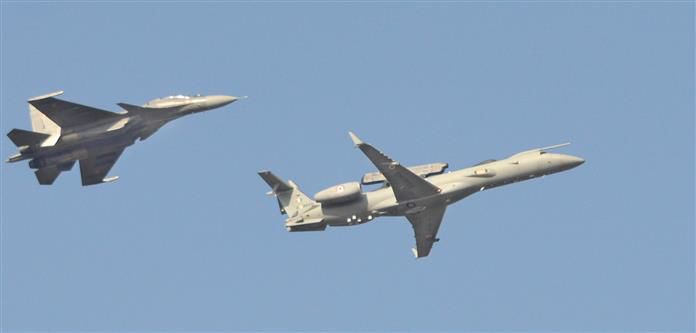Defence Ministry issues request for information to procure 6 Airborne Early Warning and Control Systems for IAF
Vijay Mohan
Chandigarh, July 20
The Ministry of Defence has issued a request for information (RFI) to procure six Airborne Early Warning and Control Systems (AEW&C), along with associated ground equipment for the Indian Air Force.
The offer, aimed at bolstering the IAF’s surveillance capability, is open only for registered Indian vendors and Indian original equipment manufacturers, according to the RFI that was issued on July 19.
The main purpose of the AEW&C is to provide long range radar detection. It is a system of systems mounted on aircraft that consists of a radar, electronic surveillance measures (ESM), communication support measures (CSM), command & control (C2), battle management system and networking through data links.
The IAF’s requirement is for jet-engined aircraft with an endurance of at least eight hours along with air-to-air refuelling capability, operational altitude of 40,000 feet and above, latest navigation systems and cruise speed higher than Mach 0.7.
The system’s primary radar should have a 360-degree coverage and the capability to detect and track large bodied aircraft to slow unmanned aerial vehicles having a low radar cross section at ranges above 550 km and flying at heights ranging from 100 feet to 65,000 feet.
An identification friend and foe system, self-protection electronic warfare suite, data links and a mission suite to enable seamless integration of AEW&C with the IAF’s command and control grid for network centric operations are among other requirements listed out in the RFI.
Vendors can offer a platform that is already customised as an AEW&C, or modify a suitable aircraft according to specifications laid out by the IAF. A pre-owned aircraft can also be used for the purpose.
According to sources, the IAF has projected a requirement of 12 AEW&Cs, also known as ‘eyes in the skies’ to effectively monitor the airspace along the borders.
At present it has a fleet of three ageing Russian A-50, based on the IL-76 airframe with Israeli avionics and two Netra aircraft developed indigenously by the Defence Research and Development Organisation (DRDO).
The DRDO is also actively pursuing an AEW&C programme and is in the process of developing a new, more advanced mission suite than the existing one in the Netra. Inducted in 2017, a Netra aircraft was deployed in a combat situation for the first time during the Balakote operations in 2019.
Recently, the IAF also procured six Airbus A320 and one A319 passenger liners from Air India. These are expected to be modified for intelligence gathering missions and electronic warfare operations and could possibly be used as a platform for AEW&Cs.
The IAF’s present fleet of five AEW&Cs is relatively small as compared to its two hostile neighbours.
China has a fleet of 20 Shaanxi KJ-500 20, four Shaanxi KJ-200 and four KJ-2000, while Pakistan has four Chinese ZDK-03 Karakoram Eagle and eight Swedish Saab 2000 Erieye platforms.









